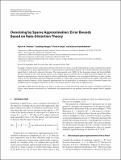Denoising by Sparse Approximation: Error Bounds Based on Rate-Distortion Theory
Author(s)
Goyal, Vivek K.; Fletcher, Alyson K.; Rangan, Sundeep; Ramchandran, Kannan
Download1687-6180-2006-026318.pdf (1018.Kb)
OPEN_ACCESS_POLICY
Open Access Policy
Creative Commons Attribution-Noncommercial-Share Alike
Metadata
Show full item recordAbstract
If a signal is known to have a sparse representation with respect to a frame, it can be estimated from a noise-corrupted observation by finding the best sparse approximation to . Removing noise in this manner depends on the frame efficiently representing the signal while it inefficiently represents the noise. The mean-squared error (MSE) of this denoising scheme and the probability that the estimate has the same sparsity pattern as the original signal are analyzed. First an MSE bound that depends on a new bound on approximating a Gaussian signal as a linear combination of elements of an overcomplete dictionary is given. Further analyses are for dictionaries generated randomly according to a spherically-symmetric distribution and signals expressible with single dictionary elements. Easily-computed approximations for the probability of selecting the correct dictionary element and the MSE are given. Asymptotic expressions reveal a critical input signal-to-noise ratio for signal recovery.
Date issued
2006-03Department
Massachusetts Institute of Technology. Department of Electrical Engineering and Computer Science; Massachusetts Institute of Technology. Research Laboratory of ElectronicsJournal
EURASIP Journal on Applied Signal Processing
Publisher
Hindawi Publishing Corporation
Citation
Fletcher, Alyson K. et al. “Denoising by Sparse Approximation: Error Bounds Based on Rate-Distortion Theory.” EURASIP Journal on Advances in Signal Processing 2006 (2006): 1-20. Web. 30 Nov. 2011. © 2006 Alyson K. Fletcher et al.
Version: Author's final manuscript
ISSN
1687-0433
1110-8657